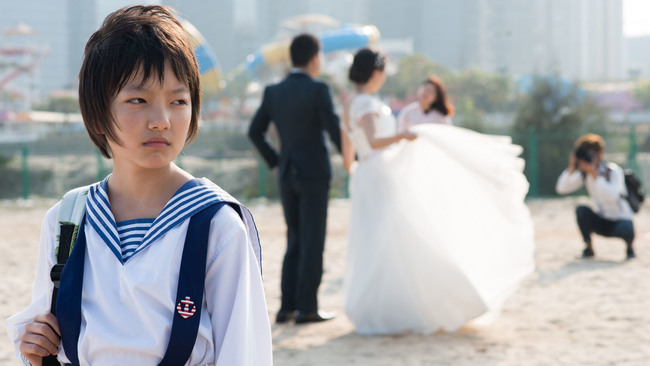Vivian Qu’s Angels Wear White

Vivian Qu’s Angels Wear White premiered in competition in Venice, screened in the Contemporary World Cinema program in Toronto, and now heads into the Official Competition at the sixty-first BFI London Film Festival.Little White Lies has asked ten LFF programmers to each make a single recommendation, and this is Kate Taylor’s: “Angels Wear White explores the way certain ideas of sexuality cast shadows on the lives of women and children, and how these ideas can be transcended.”
“While a sleepy coastal town refurbishes itself as getaway destination, a teenage migrant worker named Xioami (Wen Qi) fills in for her friend working the reception desk at a hotel,” writes Steve Macfarlane, setting it up for Cinema Scope. “There, she’s privy to evidence of an assault on two younger girls, carried out by a middle-aged guest—who turns out to be a low-level police commissioner who has intimidated the two victims into silence before a hospital visit can even confirm the rapes. Already carrying plenty on her shoulders, the tight-lipped Xioami is now the sole witness, and the subsequent investigation sees a hardened lawyer (Shi Ke) trying to buy information from her one clandestine meeting at a time. . . . Angels Wear White makes for an intriguing case study: the procedural as ambient melodrama.”
“Qu lays out a grid of muted menace as pitiless and enveloping as a Kiyoshi Kurosawa phantom yarn,” writes Fernando F. Croce. “Shot through the outsider camera’s gaze of Belgian cinematographer Benoit Dervaux, the pale shores and milky skies have a pastel ethereality constantly cracked by mysterious sights—a character’s pensive rest suddenly interrupted by a series of bridal-themed photoshoots, or a motorcycle ride around the poster-festooned ankle of a towering cement statue of Marilyn Monroe. This is only Qu’s second film, yet her lucid spareness and yen for revealing female dynamics already mark her as a director of rare gifts.”
Also in the Notebook, Kelley Dong introduces her interview with the director: “The daze induced by Angels Wear White, the follow-up to Qu's debut feature Trap Street (2013), deepens like a sliver of a needle injected beneath the skin: each detail grips like a strained muscle aching for relief. . . . Angels Wear White is not complex; it picks a side and stands by it.”
“Qu’s vision, both as writer and director, is sympathetic to her characters’ struggles, yet her social commentary is savage, subtle and precision-tooled,” writes Michael Leader for Sight & Sound.
“Dramatically exceptionally subdued, this story of rape and corruption leaves all the violence and histrionics off-screen,” writes Boyd van Hoeij in the Hollywood Reporter. “Luminously filmed but restrained to a fault, this is the kind of drama that suggests something about the difficult position of women in China, but what exactly the film wants to say is harder to pin down.”
More from Maggie Lee in Variety, where she notes that Qu produced Diao Yinan’s Black Coal, Thin Ice, which won the Golden Bear at the Berlinale in 2014, and from Marta Bałaga at Cineuropa and Fionnuala Halligan in Screen.
Update, 10/9: For Film International,Tom Ue talks with Qu about “her goals with the film and some of the social concerns that motivated this project.”
Update, 10/16: “Angels Wear White becomes a bottomless pit of despair consuming complex characters with nowhere to go,” writes Jared Mobarak at the Film Stage. “There’s a glimmer of hope at the very end, but it can’t help from feeling bittersweet considering the long list of people who’ve been virtually run over by a freight train of hearsay, double-talk, and empty promises. . . . The futility is overwhelming, the ease towards protecting the predator over prey disgusting in its absolute authenticity.”
For news and items of interest throughout the day, every day, follow @CriterionDaily.



